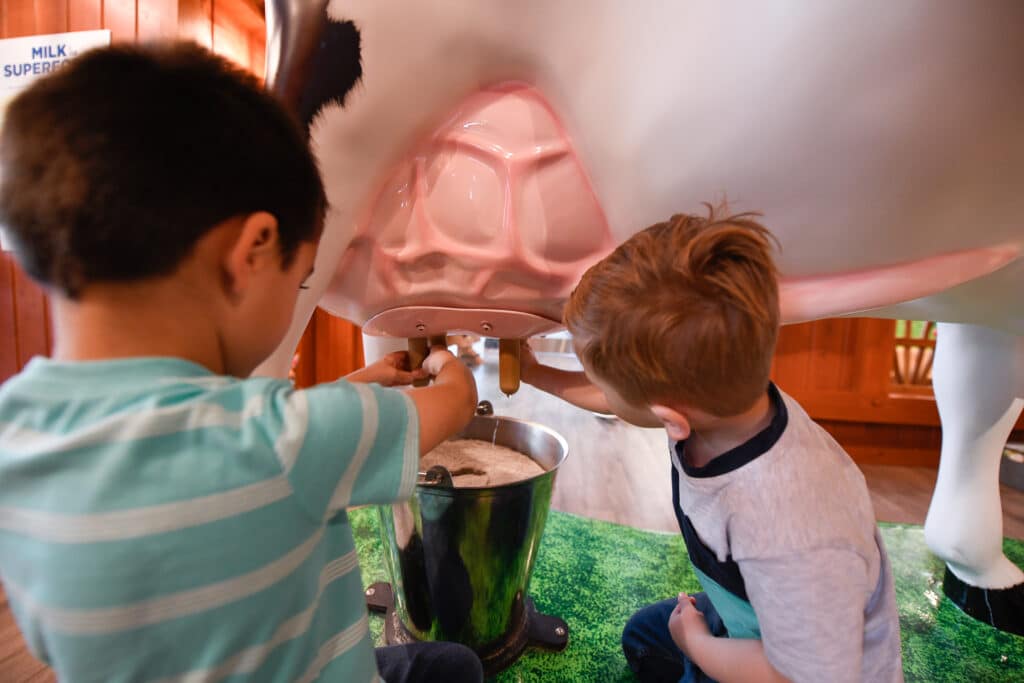By Katy Crawford
Access & Inclusion Specialist
You already know social skills are necessary for children’s social-emotional learning and development. But how do you effortlessly teach them in a way that introduces them into your kid’s daily routine?
❓ Did you know? Strong social skills are an indicator of success in future life. ❓

Social skills are not easily learned, and guiding your child through the process of developing them is critical for their social-emotional learning and development. Especially after coming out of a global pandemic, many of us have been deprived of practicing our social skills, which means that even many adults have a current deficit in this area.
A consequence of the COVID-19 pandemic was an overall switch to spending an increased amount of time on screens. Additionally, many of us did not grow up with all the screens that children have access to nowadays. I remember having to call my friend’s landline phone when I was a kid. Then I’d have to talk to their parents before I could even talk to my friend! 😲 Technology has definitely affected the development of social skills in many ways, some positive and some negative.
What Are Social Skills?
Social skills are the tools individuals use to communicate, interact, and form healthy relationships; they are crucial for a successful life. Social skills are an important part of childhood development and social-emotional learning. The term social skills is quite a broad word and there are various types of skills in this category. Most basically, it is the ability to follow directions or use manners when interacting with others. Then, there are more complex skills like problem-solving or empathy. It is pertinent to keep in mind that social skills are always a work in progress and appropriate social skills are different as children develop.
Examples of Social Skills:
- Sharing
- Following directions
- Listening
- Making eye contact
- Using Manners
- Problem Solving
- Expressing Emotions
- Advocating for Oneself
Impact of Poor Social Skills
When children have poor social skills, they cannot effectively communicate their feelings, wants, and needs. Research has shown the negative impacts of poor social skills, including:
- Increased stress and loneliness
- Difficulty building and maintaining healthy relationships
- Poor academic performance
Benefits of Good Social Skills
When children have appropriate social skills, they can effectively communicate their feelings, wants, and needs. Children equipped with social skills have various benefits, including:
- Decrease in stress – Researchers have found when children learn a new social skill, they experience a decrease in cortisone, which is a hormone released during stressful situations.
- Improved ability to communicate and build relationships– Researchers have found that children with strong social skills have improved cooperation and social awareness skills.
- Greater academic achievement- Studies have found individuals with strong social skills have higher graduation rates and increased college readiness skills.
- Ongoing development of social-emotional learning skills
Ways to Develop Children’s Social Skills
- Modeling and practicing social skills with your child in daily interactions are authentic ways to develop this skill. For example, when you go to the grocery store, have a discussion with your child as you greet others. Show them how you use your manners and let them practice.
- Read social skills storybooks together. Extensive research has proven that well-developed social skills lead to various positive life outcomes, including improved mental health and academic performance. Studies support the idea that storytelling is one of the best ways to enhance social-emotional skills for toddlers.
- Learn through play. Playing with your child has been proven to improve their social skills. There are various ways to play, including building blocks, playing with stuffed animals, playing board games, playing in nature, dancing, etc. Come on over and play at Explore and More!
- 💡Idea: You can have your child become an actor/actress! 🎭 Provide scenarios where your child has to practice a specific social skill. Role-play is a memorable and fun way to learn. We have various opportunities to dress up and play at Explore and More!
Some ideas include:
1. Meeting a new person (practice making eye contact, introducing self, listening, etc.)
2. Taking turns with a toy (use manners, problem-solving)
Overall, if we teach kids social skills from an early age, they will have the foundations they’ll need as adults. You can try the above strategies to model and integrate social skills into your daily routine. ♥️ You’re clearly an awesome caregiver because you’re here reading this. ♥️
